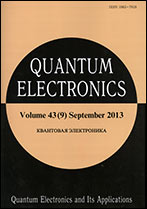|
Lasers. Active media
Influence of the addition of hydrogen on the operation of a copper iodide laser
K. I. Zemskov, A. A. Isaev, S. V. Markova, G. G. Petrash
P. N. Lebedev Physical Institute, Russian Academy of Sciences, Moscow
Abstract:
An experimental investigation was made of the influence of the addition of molecular hydrogen on the characteristics of a copper iodide laser. An analysis was made of the weak, compared with a copper bromide vapour laser, influence of the addition of hydrogen on the copper iodide laser parameters.
Received: 30.03.1998
Citation:
K. I. Zemskov, A. A. Isaev, S. V. Markova, G. G. Petrash, “Influence of the addition of hydrogen on the operation of a copper iodide laser”, Kvantovaya Elektronika, 25:7 (1998), 616–618 [Quantum Electron., 28:7 (1998), 599–601]
Linking options:
https://www.mathnet.ru/eng/qe1274 https://www.mathnet.ru/eng/qe/v25/i7/p616
|


| Statistics & downloads: |
| Abstract page: | 119 | | Full-text PDF : | 63 | | First page: | 1 |
|





 Contact us:
Contact us: Terms of Use
Terms of Use
 Registration to the website
Registration to the website Logotypes
Logotypes








